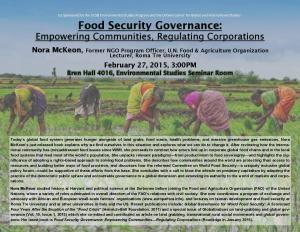Event Date:
Event Date Details:
co- sponsored by the Orfalea Center for Global & International Studies and the UCSB Environmental Studies Program
Event Location:
- Bren Hall 4016 Environmental Studies Seminar Room
Event Price:
Free!
Speaker :
Nora McKeon studied history at Harvard and political science at the Sorbonne before joining the Food and Agriculture Organization (FAO) of the United Nations, where a variety of roles culminated in overall direction of the FAO’s relations with civil society. She now coordinates a program of exchange and advocacy with African and European small-scale farmers’ organizations (www.europafrica.info), and lectures on human development and food security at Rome 3 University and at other universities in Italy and the US. Recent publications include: Global Governance for World Food Security: A Scorecard Four Years After the Eruption of the “Food Crisis”(Heinrich-Böll Foundation, 2011) and a special issue of Globalizations on land-grabbing and global governance (Vol. 10, Issue 1, 2013) which she co-edited and contributed an article on land grabbing, transnational rural social movements and global governance. Her latest book is Food Security Governance: empowering communities—regulating corporations (Routledge in January 2015).
Today’s global food system generates hunger alongside of land grabs, food waste, health problems, and massive greenhouse gas emissions. Nora McKeon’s just-released book explains why we find ourselves in this situation and explores what we can do to change it. After reviewing how the international community has (mis)addressed food issues since WWII, she proceeds to contrast how actors link up in corporate global food chains and in the local food systems that feed most of the world’s population. She unpacks relevant paradigms—from productivism to food sovereignty—and highlights the significance of adopting a rights-based approach to solving food problems. She describes how communities around the world are protecting their access to resources and building better ways of food provision, and discusses how the reformed Committee on World Food Security—a uniquely inclusive global policy forum—could be supportive of these efforts from the base. She concludes with a call to blow the whistle on predatory capitalism by adapting the practice of the democratic public sphere and accountable governance to a global dimension and extending its authority to the world of markets and corporations



